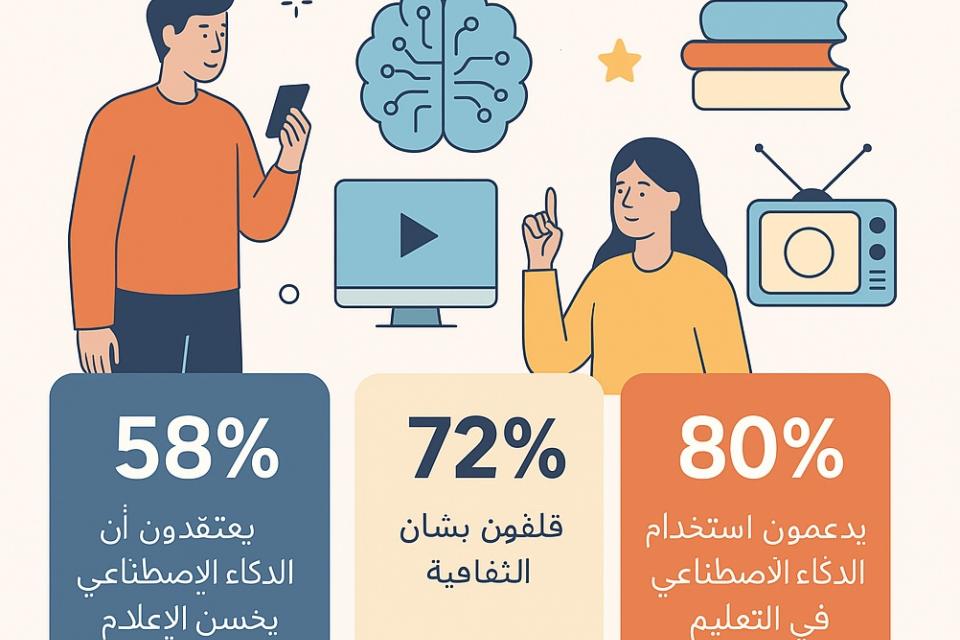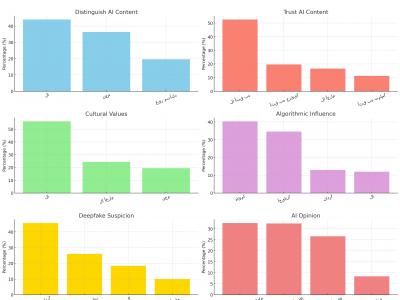Datasets
Standard Dataset
Analyzing Public Perception of AI Integration in Cultural and Media Production: A Quantitative Study Based on 2000 Responses
- Citation Author(s):
- Submitted by:
- Wael Maged Badawy
- Last updated:
- Thu, 04/10/2025 - 15:34
- DOI:
- 10.21227/ptt8-t187
- Data Format:
- License:
 56 Views
56 Views- Categories:
- Keywords:
Abstract
This paper explores public perceptions surrounding the use of Artificial Intelligence (AI) in cultural and media production across the Arab region. Based on a comprehensive questionnaire distributed among 2000 participants, the study investigates attitudes toward AI-driven content, ethical concerns, cultural identity threats, educational impacts, and legal responsibilities. The findings indicate a generally positive attitude toward AI's role in enhancing media quality and cultural education but underscore significant concerns regarding data privacy, algorithmic bias, and the absence of regulatory frameworks. This research provides data-backed insights to inform policymakers, educators, and cultural institutions on AI's integration in Arab media landscapes.
1. Introduction The rise of artificial intelligence has revolutionized global media and cultural industries. From automating news production to enabling digital heritage preservation, AI is reshaping how content is produced, distributed, and consumed. In the Arab region, where cultural heritage and social dynamics are deeply interwoven with media narratives, understanding public sentiment toward AI integration becomes crucial. This paper aims to bridge the gap in literature by presenting data-driven insights into how diverse social groups perceive AI's influence on cultural and media sectors.
2. Methodology A structured questionnaire comprising 13 core questions was distributed among 2000 respondents. The survey included demographic data (gender, age, profession) and explored themes such as AI experience, media content quality, cultural identity threats, transparency, data concerns, and education.
3. Results Preliminary analysis of the responses revealed:
- 58% of respondents believe AI significantly improves media content.
- 72% express concern over cultural identity erosion due to AI.
- 80% support using AI in cultural education.
- 64% are worried about personal data usage without consent.
- 67% agree that AI-based media should be subject to governmental regulation.
4. Discussion While AI is welcomed as a tool for modernization and educational enhancement, the data shows persistent skepticism tied to transparency and ethical use. Younger respondents (ages 20–30) are more receptive to AI-driven platforms, whereas older age groups are cautious about cultural implications. The study highlights the need for inclusive AI policies that align technological advancement with cultural preservation.
5. Conclusion This paper confirms that public perception in the Arab region is shaped by a complex interplay of opportunity and concern. Responsible AI integration requires collaborative frameworks between governments, media organizations, and cultural bodies to safeguard identity while embracing innovation.
6. Recommendations
- Establish national AI ethics councils to oversee media applications.
- Introduce AI literacy programs in schools and universities.
- Develop culturally adaptive AI systems tailored to Arabic content.
- Ensure transparency in AI-generated media.








